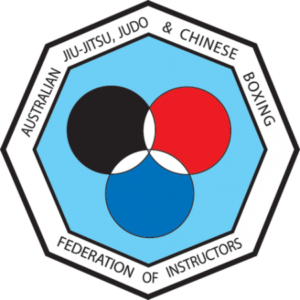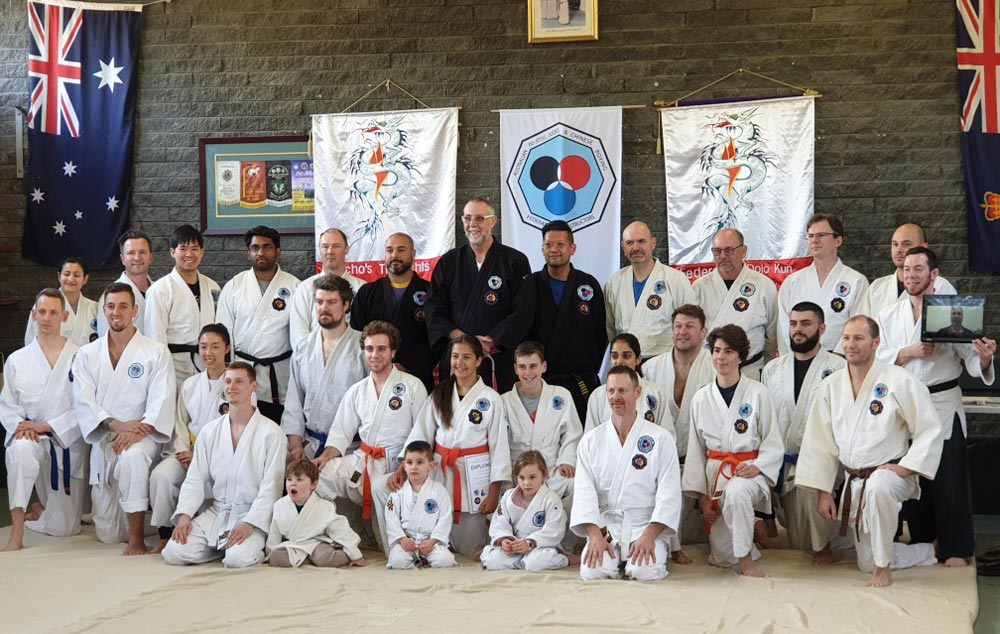
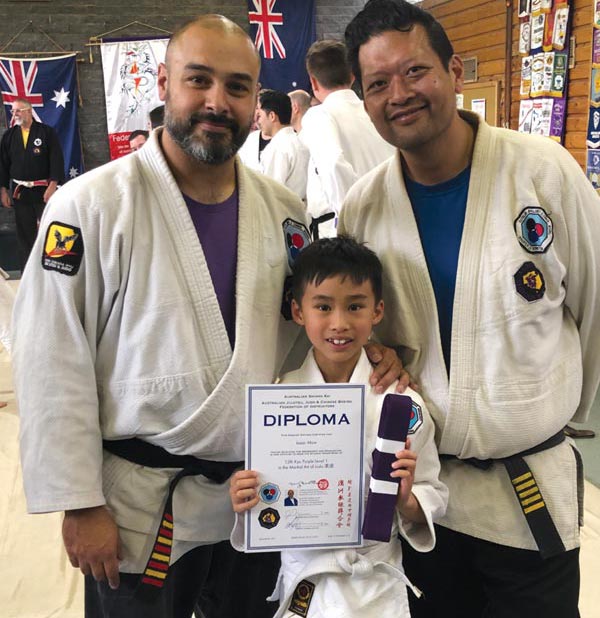
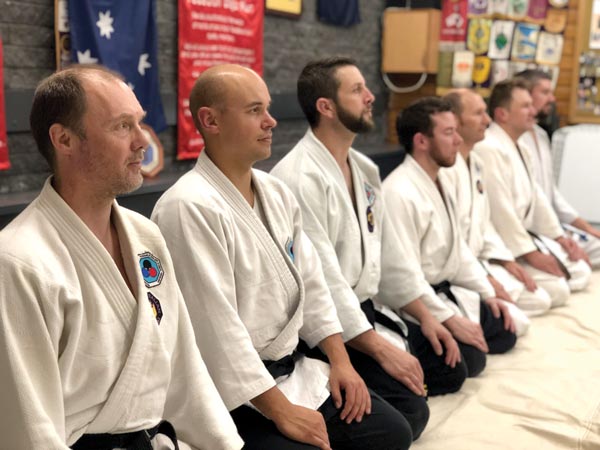
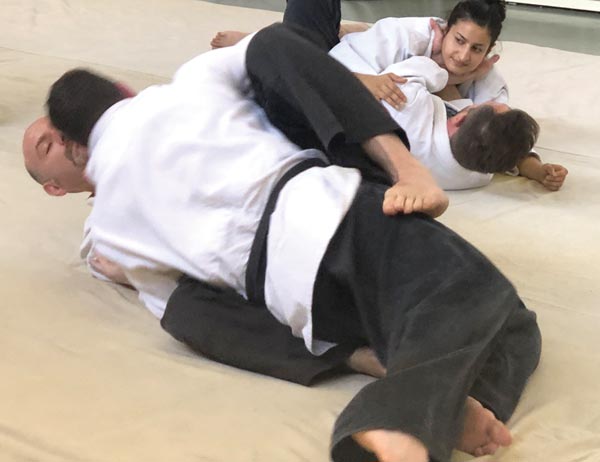
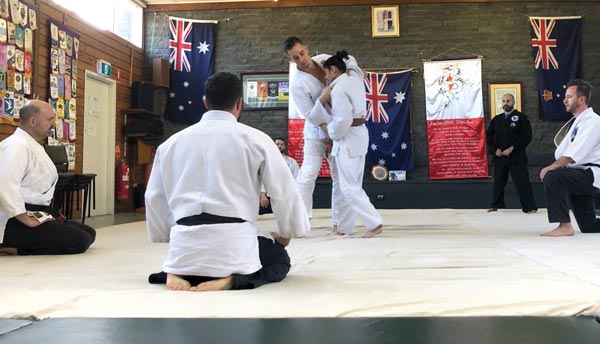
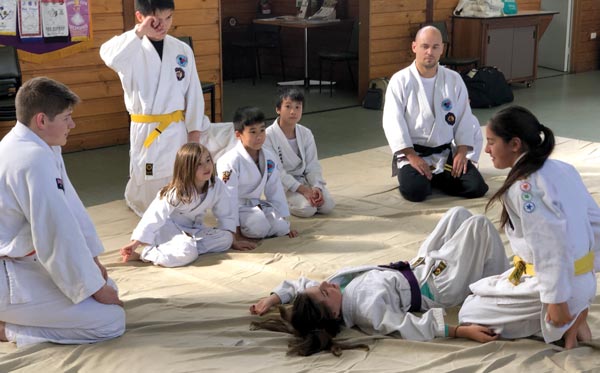
About the Federation of Instructors
Principles and Aims of the Federation
The Martial Arts taught through this organisation, we believe, develops the whole person: physically, mentally, emotionally, spiritually, and socially. We achieve this by using the martial art as a vehicle to the ultimate aim of our teaching, which is in the perfection of the character of its participants. We provide students with more than just a physical activity; we strive to provide an individual good health, intelligence, good character, and an ability to know worth. Ours is a physical and mental education based on a system of barehanded combat, not limited to just sport.
The unspoken principles of all our Academies are:
- To seek perfection of character
- To be sincere and honest
- To show strong spirit in all undertakings
- To practice courtesy and control temper
- To strive for understanding and harmony
- To inform, safeguard, and promote the general welfare of the public in matters pertaining to the martial arts on a national level.
Looking at these objectives from a traditional perspective may give us a little more insight into the principal precept, and our ultimate goal. If you were to ask if the Australian Federation of Instructors and the Australian Shihan Kai shared a motto, then it would have to be “Strive for the Completion of One’s Human Character” which, written in its original Japanese form is:
Jinkaku kansei ni tsutomeru
In translation, Jinkaku refers to human character, The initial kanji strokes used to write it in Japanese are specifically those for “man” or “human” (Jin). From this, we can immediately infer that we are not talking about some ideal, but rather of simple human nature, a nature with all its limitations. Jinkaku reminds us that we must do the best with what fate and genetics have given us.
Kansei denotes perfection achieved by the completion of a task. The real martial artist cannot expect to reach anything approaching perfection in the martial arts if that person is content to stay at their present level, and this is true of the beginner as it is of the expert. A student who enters the Dojo (place for studying the Way) with the idea that they already understand all of martial art’s objectives will have little chance of proceeding very far along the path to its true mastery. Likewise, the new black belt who thinks his/her promotion is evidence that he/she has “arrived” at the summit of knowledge and understanding has little hope of reaching the kind of perfection we are talking about here.
Kansei expresses the concept intrinsic to all budo (the Way of Combat, the Martial Arts): that the doing of a thing is a goal in itself. Gaining rank or title is secondary for the real martial artist, though it may be the opposite for many beginners taking up a martial art, For the more dedicated, acquisition of rank is as incidental as the destination of a canoeist that sets off paddling down a river. Such a canoeist may have a predetermined take-out point, but his/her real purpose in the trip is not arriving, it is experiencing the trip itself. The real martial artist knows the same satisfaction in his/her journey, overcoming obstacles, and encountering new ones in his/her quest of kansei. This journey to a completion of character is made further plain by the use of the word tsutomeru, which means, “to exert oneself’. The perfection of a martial artist is not achieved through mystical insight or some divinely granted grace, but through one’s own effort.
When we talk about perfection relating to the art, we are speaking in terms of perfection of character, not of techniques. Within our precepts nowhere is there any mention of the polishing of skill, although certainly a central part of our training. That achievement, however, can be short-lived, as the student soon learns that if they are forced to abandon practice for some reason, even if only temporarily, their abilities will deteriorate. Their skills may not deteriorate dramatically, but they will go downhill nonetheless. Now if he/she has aimed only for the perfection of physical technique, then his/her martial art will have had a limited value. If, on the other hand, he/she has followed the guidance of our precepts and pointed him or herself toward the perfection of his/her spirit and character, he/she will be able to face whatever limitations are dealt them, attaining the best possible with what he/she has.
In many ways, this first precept sets the tone for all the other of our objectives; it is the one upon which they depend. Funakoshi, the founder of karatedo, also wrote about these same precepts saying that: “The true aim lies not in victory or defeat, but in the perfection of the character of its participants”. Then a better translation of the precept is “Strive for the Completion of One’s Human Character”.
If a person seriously studies any martial art, it is inevitable that such a study will include the development of a philosophical background. It is also inevitable that, as a person grows further into the art, the interrelationship between the physical and mental aspects of the art will also be developed and strengthened. The result can be a philosophy of life in which the martial arts training serves as a base. This is an aim of the Federation, and the Shihan Kai, for all of our students.
A vision for a not for profit organisation
The Australian JiuJitsu, Judo & Chinese Boxing Federation of Instructors is a not for profit association based on the vision of its founder Kancho Bradshaw as originally founded in 1981.
In becoming members, participants accept to share that vision, help develop it and themselves within this vision. In sharing Kancho’s vision, members learn and develop, become martial artists as part of that vision.
This vision includes to:
- Operate as a not for profit organisation to provide JiuJitsu, Judo, Chinese Boxing, and martial arts, participation for its members;
- Strive to provide members with good health, intelligence, good character, and an ability to know self worth through using martial art as a vehicle to achieve this;
- Advance our styles of JiuJitsu, Judo and Chinese Boxing around Australia through development programs and the acquisition of relevant grants and funds;
- Provide a safe and quality training/ recreational/ volunteer/ spectator experience for its members;
- Act on behalf of and in the interest of its Members;
- Affiliate and liaise with the local government agency or other relevant agency with which facility lease arrangements have been made;
- To grant and/or recommend gradings, awards and promotions, and to provide an avenue for examination of members applying for gradings, awards and promotions;
- To administer and coordinate activities (such as contests, championships, tournaments, gradings, demonstrations, instruction and seminars) consistent with achieving the objectives of the Federation and to select individuals, teams and officials to carry out these functions as required;
- To adopt and interpret regulations and rules pertaining to the instruction and learning of JiuJitsu, Judo and Chinese Boxing specifically as a total self defence, using the curriculum of the Federation;
- Have regard to public interest and the local environment in all aspects of its operations;
- Undertake what is necessary to advance these objectives and vision.
- To increase the availability and access to JiuJitsu, Judo & Chinese Boxing through the establishment of Academies and providing of courses, workshops and seminars.
Our Federation functions thanks to our members who volunteer their time and who have taken roles within the Federation because they are passionate about the advancement of our Martial Arts and passing on the knowledge that has been passed on to them. We are our members.
Find a Martial Arts school near you...
Bayswater
Class held
Tuesday
7:15 pm – 8:45 pm JiuJitsu & Judo
8:45 pm – 9:45 pm JiuJitsu & Judo 6th Kyu +
Box Hill South
Classes held
Monday: 7:30 pm – 9 pm JiuJitsu & Judo
Wednesday: 6 pm – 7 pm Junior JiuJitsu & Judo
Wednesday: 7 pm – 8 pm Kung Fu
Wednesday: 8 pm – 9:30 pm JiuJitsu & Judo
Saturday: 11 am – 12:30 pm Junior JiuJitsu & Judo
Saturday: 2 pm– 3:30 pm JiuJitsu & Judo
Caulfield
Monash University (Caulfield)
Class held
Wednesday: 7:30 – 9:15 pm
Monash Sport Caulfield -
Group Fitness Studio
JiuJitsu & Judo
Clayton
Monash University (Clayton)
Classes held
Monday: 6:45 pm – 8:30 pm
Monash Sport Clayton -
Multi-Purpose Room
JiuJitsu & Judo
Viewbank
Class held
Sunday: 2 pm – 4 pm
JiuJitsu & Judo 13y/old to Adult
Sunday: 4 pm – 5 pm
Junior JiuJitsu & Judo
8-12 year old
Viewbank Primary
Class held
Friday: 1 pm – 1:50 pm JiuJitsu & Judo
for Viewbank Primary Students Only
